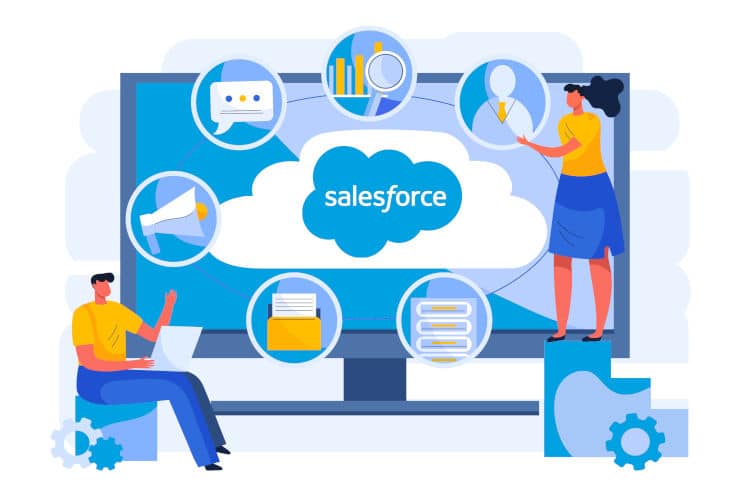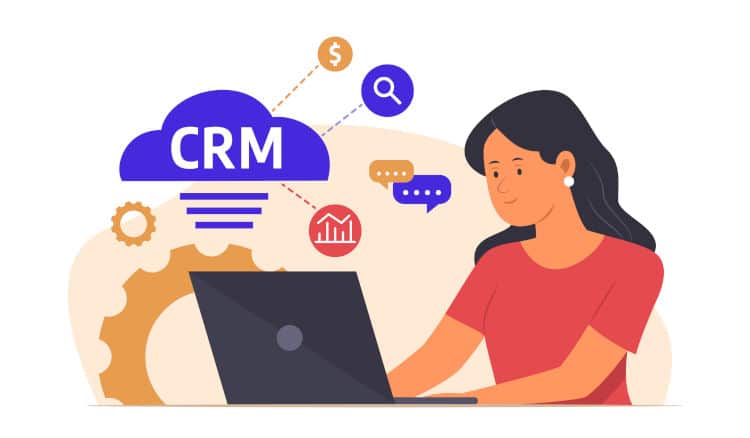A Salesforce course will enable you to acquire expertise in handling the cloud solutions of the leading American customer relationship management company, and to obtain certification as an administrator, developer or architect. Find out all the reasons to take such a course, and how to choose the best one!
Effective customer relationship management is one of the keys to business success. With more than 150,000 users worldwide, Salesforce stands out as one of the leaders thanks to its platform.
It offers a complete range of functionalities for optimising sales, customer service, marketing and much more. That’s why so many organisations are adopting it.
However, deploying Salesforce is only the first step. To get the most out of it, professionals need to master this cloud-based solution. That’s why training is now a must.
What is Salesforce?
Founded in 1999 by Marc Benioff and Parker Harris, Salesforce revolutionised the world of CRM with its cloud-based approach. An innovation that went completely against the grain of traditional local solutions at the time.
Over the years, thanks to its meteoric growth, the American firm has been able to expand its portfolio of products and services to meet the changing needs of businesses of all sizes and in all sectors.
Its ecosystem encompasses a wide variety of solutions. The Sales Cloud is designed for sales teams and offers a suite of tools for managing leads, opportunities, sales forecasts and much more.
The Service Cloud, meanwhile, enables companies to provide exceptional customer service by centralising all customer interactions by phone, email, chat or even on social networks.
The Marketing Cloud is ideal for marketing professionals. It offers advanced tools for creating personalised campaigns, automating workflows and analysing performance.
Other tools offered by Salesforce include the Commerce Cloud for e-commerce, Einstein Analytics for advanced data analysis, and more recently Einstein GPT artificial intelligence.

Why take Salesforce training?
For companies looking to optimise their operations and stay competitive, Salesforce training represents a genuine strategic investment.
It enables teams to learn how to use Salesforce effectively, reducing inefficiencies and speeding up processes. This is a major improvement in productivity.
When used properly, the many features and different modules can transform business operations, from marketing to sales and customer service. The various processes can then be optimised.
Overall, Salesforce enables companies to centralise customer information and offer more personalised interactions to dramatically improve the customer experience. This boosts loyalty and retention.
For professionals, such training can open up new career opportunities. With the increasing adoption of Salesforce, the demand for certified and skilled professionals is growing.
Training or certification can open the door to a multitude of vocations, such as Salesforce developer, consultant, architect or administrator, to name but a few.
So even if the investment in training may seem expensive at first, it can pay for itself very quickly. On average, according to Talent.com, a Salesforce administrator in France earns €45,000 a year.
The different types of Salesforce training
There are many Salesforce training courses available. Face-to-face sessions are available, often delivered by certified experts, and offer an immersive learning experience.
However, as an alternative, many platforms also offer online courses dedicated to this platform. In both cases, participants can access high-quality content, follow tutorials and webinars, and even interact with certified instructors.
The advantage of an online course is that you can progress at your own pace and from the comfort of your own home. In addition, Salesforce offers a full range of resources such as guides, video tutorials, official documentation and community forums.
These self-training resources are ideal for people who want to expand their knowledge independently and flexibly according to their specific needs and schedule.
To choose the right course, you need to assess your needs or those of your company. This may involve identifying the key skills to be acquired, the objectives to be achieved or potential areas for improvement.
Similarly, it’s important to choose the right training method based on your needs, level of experience and preferences. In all cases, the content must be up-to-date, relevant and aligned with your ambitions.
Practical application is very important to reinforce your skills and ensure a thorough understanding. Implementing what you have learned in real-life scenarios and taking part in practical projects allows you to apply your knowledge in real-life situations, which will be very useful to you later on.

Salesforce certification: why is it important?
To enable professionals to demonstrate their mastery, Salesforce offers a range of certifications. These credentials demonstrate the commitment of their holders to excellence, reinforcing professional credibility and opening the door to more advantageous opportunities.
The different levels of certification meet the needs and aspirations of professionals at different stages of their careers. The Certified Administrator is aimed at beginners and intermediates alike, and validates fundamental skills in configuring, customising and managing Salesforce.
Experienced developers can opt for Certified Developer, a certification that assesses the ability to design, develop and deploy applications on the platform.
Finally, Certified Consultant, as its name suggests, is aimed at consultants as well as Salesforce architects. It certifies their expertise in designing CRM solutions tailored to meet specific customer needs!
To obtain these certifications, however, you need to pass an exam. Rigorous preparation is essential, and taking part in official training courses can be very useful.
The same goes for studying the recommended guides and resources, practising on real-life scenarios and taking mock exams to assess knowledge and skills.
What’s more, it’s imperative that you keep up to date with the latest updates and innovations on the Salesforce platform. Forums and community groups for sharing knowledge and experience will also be invaluable.
The best way to pass the exam is to opt for online training provided by real experts, such as those offered by DataScientest!
Conclusion: Salesforce training, an invaluable asset for your company
With a wide range of cloud-based enterprise solutions, Salesforce has established itself as a key reference across all business sectors. From sales to customer service and marketing, its various platforms cover all customer relationship management needs.
Salesforce certification is a solid advantage for your career, enabling you to stand out as a developer, architect, administrator or specialist consultant.
To acquire expertise in handling this platform, you can choose DataScientest. Our various distance learning courses enable you to master Salesforce, as well as the main cloud platforms such as Amazon Web Services and Microsoft Azure.
Our courses will also enable you to develop your skills so that you can work in Data Science professions such as Data Scientist, Data Engineer, Data Analyst, Data Product Manager or Machine Learning Engineer.
All our programmes can be completed remotely via BootCamp, Continuing Education or sandwich courses, and lead to a state-recognised diploma and AWS or Azure certification. Find out more about DataScientest!

You now know everything there is to know about Salesforce training. For more information on the same subject, read our full report on Salesforce and our general report on Cloud Computing.










